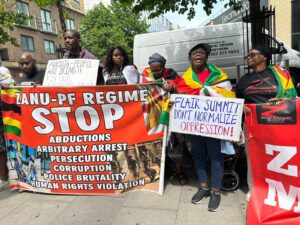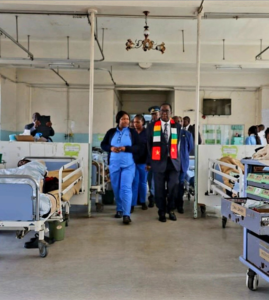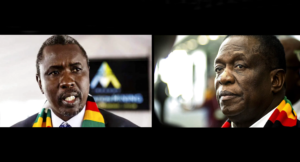MNANGAGWA EXTENDS TOP GENERAL’S TERM TO SECURE POWER

President Emmerson Mnangagwa has extended the tenure of General Phillip Valerio Sibanda, the commander of the Zimbabwe Defence Forces, by another year. This move is seen as a way to ensure stability in the military, secure his position, and keep his rival, Vice-President Constantino Chiwenga, in check. The extension helps Mnangagwa protect his government from possible threats, including a coup.
The announcement was made by Martin Rushwaya, Chief Secretary to the President and Cabinet, through an official notice. It stated:
“General Notice 15 of 2025.
DEFENCE ACT [CHAPTER 11:02]
Extension of Term of the Commander of the Zimbabwe Defence Forces
IT is hereby notified that His Excellency the President has, in terms of proviso (i) to the Defence (Regular Force) (Officers) Regulations 1988, published in Statutory Instrument 152 of 1988, extended the appointment of General Philip Valerio Sibanda as Commander of the Zimbabwe Defence Forces with effect from the 24th December 2024 to the 23rd November 2025.
M. RUSHWAYA, Chief Secretary to the President and Cabinet.”
General Sibanda has been a key ally of Mnangagwa. He played a major role in keeping him in power since Mnangagwa took over through a military coup in November 2017. Without Sibanda’s support, Mnangagwa could face serious political and security risks. One example of this vulnerability happened in January 2019, when Mnangagwa was almost removed from power while he was on a trip to Russia and other countries in Eastern Europe.
Mnangagwa and Chiwenga, his deputy, have been locked in a power struggle for control over the ruling Zanu PF party. Chiwenga has strong support from parts of the military and his faction within the party. Mnangagwa’s decision to extend Sibanda’s term may weaken Chiwenga’s influence and reduce the threat to his leadership. This also helps Mnangagwa prepare for his goal to remain in power beyond 2028, despite the constitutional limit of two terms. His ambitions to rule until 2030 make his rivalry with Chiwenga even more dangerous.
By keeping Sibanda as the head of the military, Mnangagwa aims to secure loyalty from the armed forces. The military has always played a powerful role in Zimbabwe’s politics. Mnangagwa’s rise to power in 2017 was made possible by military backing, and his survival as president depends heavily on continued support from senior military leaders like Sibanda.
This extension is not just about leadership within the military; it is also about Mnangagwa’s survival. A strong ally like Sibanda reduces the chances of a coup or rebellion from within the armed forces. At the same time, this decision sends a message to his rivals in both the military and the ruling party that Mnangagwa is still in control and will take steps to protect his rule.
However, this move could also deepen divisions within the ruling Zanu PF party and the military. Chiwenga’s camp may see this as a direct challenge and respond by pushing back against Mnangagwa’s efforts to strengthen his hold on power. The rivalry between Mnangagwa and Chiwenga has already created tension in the government, and this decision could add more pressure.
As Mnangagwa prepares for the years ahead, the balance of power within Zimbabwe’s leadership remains uncertain. Extending Sibanda’s tenure gives Mnangagwa an advantage, but it also shows how fragile his position is. Without strong allies in the military and party, his hold on power could face serious challenges.
Mnangagwa’s focus on securing his leadership highlights the ongoing struggle for control in Zimbabwe’s government. The decision to extend General Sibanda’s term reflects his efforts to stay ahead of his rivals and ensure the military remains on his side. This strategy could help him stay in power for now, but the tensions it creates may shape Zimbabwe’s future in unpredictable ways.



